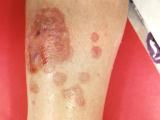The Centers for Disease Control and Prevention (CDC) today detailed an unusual 255-case outbreak of Salmonella Newport infections in 32 states tied to both beef and soft cheese and showing resistance to multiple antibiotics.
"Infections were linked to beef obtained in the United States and soft cheese obtained in Mexico, suggesting that this strain could be present in cattle in both countries," the CDC said in an overview emailed to physicians as part of its Clinician Outreach and Communication Activity (COCA) efforts.
"Antibiotic susceptibility testing showed that the strain had decreased susceptibility to azithromycin and nonsusceptibility to ciprofloxacin–two commonly prescribed oral antibiotics," the agency added. "This leaves ceftriaxone, an injectable antibiotic, as the recommended treatment option."
Ian Plumb, MBBS, lead author of a study on the outbreak today in Morbidity and Mortality Weekly Report (MMWR), told CIDRAP News, "We are continuing to see cases occurring among patients. The antibiotic resistance pattern of this strain is alarming because the primary oral antibiotics used to treat patients with this type of Salmonella infection may not work."
Plumb is an epidemiologist with the CDC's Enteric Disease Branch. He and his colleagues in the MMWR update said oral azithromycin is also an option. Plumb added via email, "Most patients with Salmonella infections do not need antibiotic treatment, but some patients do, if there is severe disease, or if a clinician identifies risk factors for severe disease."
He added, "The best way for clinicians to guide treatment is to test whether a bacteria is resistant for that individual patient." Plumb also noted that the Infectious Diseases Society of America has published guidelines here on managing Salmonella infections.
Sixty hospitalized, 2 dead
The outbreak cases date from June 2018 to March 2019, and the CDC first identified the multidrug-resistant (MDR) Salmonella strain in September, according to the MMWR report. Of 206 patients with available information, 89 (43%) reported recent travel to Mexico.
Sixty of 209 patients (29%) were hospitalized, including 4 (6% of those with available data) requiring intensive care. Ten of 255 patients (4%) had Salmonella bacteremia (blood infection), and two patients died, the CDC said.
Patients ranged in age from less than 1 to 90 years, with a median age of 36. More than half (58%) were female, and 65% were Hispanic.
The CDC said in its COCA email, "Resistant infections can be harder to treat, and patients may be at increased risk for developing serious complications."
Among patients who traveled to Mexico and had information on foods they ate, 41 of 47 (87%) reported eating beef, and 29 of 46 (63%) reported eating soft cheese, the MMWR report noted. Among the 29 who ate soft cheese, 23 (79%) said they obtained the cheese in Mexico, most often queso fresco, a cheese that is typically made with raw (unpasteurized) milk.
Among patients who did not travel to Mexico, 20 of 70 (29%) reported eating Mexican-style soft cheese, and 68 of 73 (93%) reported eating beef. Inspectors detected the outbreak strain in beef samples collected in November 2018 and March 2019 at two Texas slaughter and processing facilities, the CDC said in the MMWR report. It added, however, "Review of patient information did not identify any common suppliers of contaminated beef or cheese."
When asked why the CDC was announcing this outbreak via MMWR and not with a typical outbreak announcement, Plumb said the report summarizes a complex investigation and added, "Decisions to warn the public during an investigation are based on a number of factors, including whether a source for infections has been identified, and whether there are new recommendations for consumers.
"This investigation did not identify a specific contaminated product, and cases were not linked geographically. Our findings support existing CDC recommendations to prepare beef safely, and to only eat soft cheese that is made with pasteurized milk."
Dairy cattle possible source
Isolates from the Mexican cheese, the cecum of beef cattle, and beef samples were matched closely by whole-genome sequencing.
"In this MDR outbreak, consumption of cheese and consumption of beef were both associated with illness, indicating that dairy cattle were a likely source of these infections," the MMWR authors said. "The detection of the outbreak strain in cheese purchased in Mexico and the high percentage of travelers to Mexico who reported eating Mexican-style soft cheese suggest that soft cheese from Mexico was a source of infection.
"Mexican-style soft cheese has been previously identified as a source of other Salmonella outbreaks. The reported consumption of queso fresco, travel to various regions in Mexico, and detection of indistinguishable Newport strains in beef and cheese suggest that contamination of soft cheese resulted from carriage by cattle rather than poor hygiene during cheese production.
"Dairy cattle often are used as a source of ground beef and have been implicated in previous MDR Newport outbreaks."
Plumb said, "Any use of antibiotics in humans or in animals can increase the risk of resistant bacteria spreading, so it’s important only to use antibiotics when they are needed. Avoiding unnecessary use of antibiotics in cattle that are also used to treat people could help prevent bacteria spreading, and can lower the risk of resistant strains in animals leading to illness in people."
Recent emergence of drug resistance
Among 252 isolates tested for antibiotic resistance, 226 (90%) had resistance genes against trimethoprim-sulfamethoxazole, tetracycline, and chloramphenicol, and decreased susceptibility to azithromycin, the CDC experts said in the report. And 143 isolates (57%) demonstrated additional resistance to ampicillin and streptomycin, as well as nonsusceptibility to ciprofloxacin. All resistance genes were located on an IncR plasmid.
"The presence of resistance genes on a plasmid is concerning because of the potential for spread to other bacteria," the MMWR authors said. Plasmids can transfer genetic material not just among bacteria of the same species, but across pathogen species, as well.
"The outbreak strain appears to have emerged recently because Newport with decreased susceptibility to azithromycin was not detected in animal, retail meat, or human isolates in NARMS [National Antimicrobial Resistance Monitoring System] surveillance before 2016," the authors noted.
The authors conclude, "Whole-genome sequencing was valuable in linking human infections to food sources, distinguishing the MDR outbreak strain from an antibiotic-susceptible strain causing a simultaneous outbreak, and predicting antibiotic resistance. In this outbreak, one in three patients received an antibiotic that was likely to have been ineffective."
See also:
Aug 23 MMWR report























